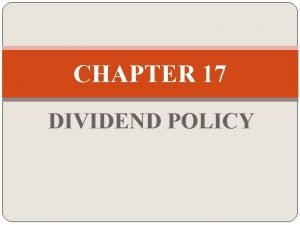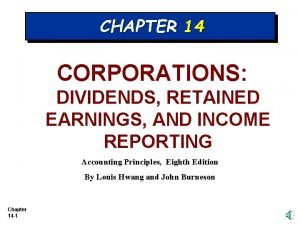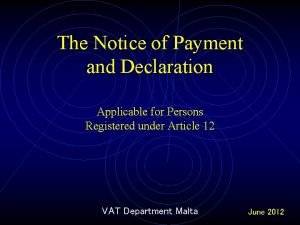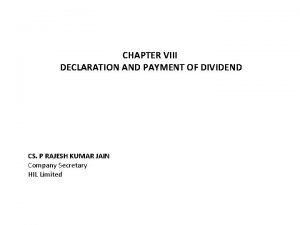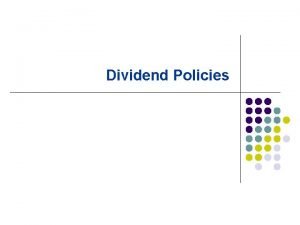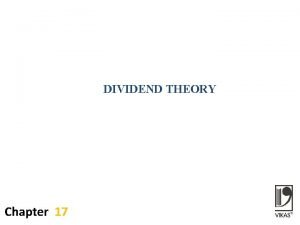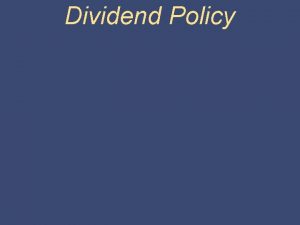DECLARATION AND PAYMENT OF DIVIDEND DECLARARTION OF DIVIDEND


![SOURCES OF DIVIDEND [S. 123] The dividends can be declared out of – Current SOURCES OF DIVIDEND [S. 123] The dividends can be declared out of – Current](https://slidetodoc.com/presentation_image_h2/ee47ff58605bdb153c893fe7cf4f7033/image-3.jpg)

![Interim Dividend [S. 123(3)] � Board of directors of a company may declare interim Interim Dividend [S. 123(3)] � Board of directors of a company may declare interim](https://slidetodoc.com/presentation_image_h2/ee47ff58605bdb153c893fe7cf4f7033/image-5.jpg)








- Slides: 13

DECLARATION AND PAYMENT OF DIVIDEND

DECLARARTION OF DIVIDEND (AS PER THE PROVISIONS OF COMPANIES ACT, 2013) Dividend can be defined as the sum of money paid by a company, to its shareholders, out of the profits made by a company, if so authorized by its articles, in proportion to the amount paid- up on each share held by them. SECTION 123 TO 127 OF COMPANIES ACT, 2013 READ WITH THE COMPANIES (DECLARATION AND PAYMENT OF DIVIDEND) RULES, 2014 deals with the declaration and payment of dividend.
![SOURCES OF DIVIDEND S 123 The dividends can be declared out of Current SOURCES OF DIVIDEND [S. 123] The dividends can be declared out of – Current](https://slidetodoc.com/presentation_image_h2/ee47ff58605bdb153c893fe7cf4f7033/image-3.jpg)
SOURCES OF DIVIDEND [S. 123] The dividends can be declared out of – Current year’s profit of the company, or Undistributed or accumulated profits of the previous year, or Out of money provided by the central or a state government for the payment of dividend by the company in pursuance of guarantee given by that government (* No company shall declare dividend unless carried over previous losses and depreciation not provided in previous year or years are set off against profit of the company for the current year. )

Dividend in case of inadequacy of profits In case of inadequacy or absence of profits in any financial year, a company may declare dividend out of the accumulated profits earned by it in previous years after fulfilling the following conditions. [Rule 3 of Companies (Declaration and Payment of Dividend) Rules, 2014. ] � The rate of dividend declared shall not exceed the average of the rates at which dividend was declared by it in the three years immediately preceding that year. Provided that this sub-rule shall not apply to a company, which has not declared any dividend in each of the three preceding financial year. � The total amount to be drawn from such accumulated profits shall not exceed one-tenth of the sum of its paid-up share capital and free reserves as appearing in the latest audited financial statement. � The amount so drawn shall first be utilized to set off the losses incurred in the financial year in which dividend is declared before any dividend in respect of equity shares is declared. � The balance of reserves after such withdrawal shall not fall below fifteen per cent of its paid-up share capital as appearing in the latest audited financial statement.
![Interim Dividend S 1233 Board of directors of a company may declare interim Interim Dividend [S. 123(3)] � Board of directors of a company may declare interim](https://slidetodoc.com/presentation_image_h2/ee47ff58605bdb153c893fe7cf4f7033/image-5.jpg)
Interim Dividend [S. 123(3)] � Board of directors of a company may declare interim dividend during any financial year or at any time during the period from closure of financial year till holding of the annual general meeting, out of the profits made by the company during such financial year or out of previous year undistributed profits. � In case the company has incurred loss during the current financial year up to the end of the quarter immediately preceding the date of declaration of interim dividend, such interim dividend shall not be declared at a rate higher than the average dividends declared by the company during the immediately preceding three financial years. � Note: As per Section- 2(35) “dividend includes interim dividend” signifies that the provisions of Companies Act 2013, applicable to the final dividend to the extent possible, shall also applicable on interim dividend.

Payment of dividend • The amount of the dividend, including interim dividend, shall be deposited in a scheduled bank in a separate account within five days from the date of declaration of such dividend. • No dividend shall be payable except by way of cash, where dividend payable in cash can also be paid through cheque, warrant or in any electronic mode, to the shareholder who is entitled to the dividend. Condition: – A company who has committed any default in compliance with the provisions of section 73 and 74 relating to the acceptance and repayment of deposits would be barred to declare dividend.

Procedure for Declaration and payment of Dividend 1. Issue atleast 7 clear days notice of the meeting of Board of directors. 2. Hold Board meeting and pass resolution for recommending the final amount of dividend. 3. Close the register of members and the share transfer register of the company. 4. Hold a Board/committee meeting for approving registration of transfer/ transmission of the shares of the company, which have been lodged with the company prior to the commencement of book closure. 5. Hold the annual general meeting and pass an ordinary resolution declaring the payment of dividend to the shareholders of the company as per recommendation of the Board. 6. In case of Interim dividend, it is not mandatory to take approval of shareholders for declaration of Dividend, the

7. 8. 9. 10. 11. 12. Prepare a statement of dividend in respect of each shareholder. Separate Bank Account is required to be opened and amount of dividend payable shall be credited to the said account within 5 days of declaration. Make arrangements with the bank and in collaboration with other banks if required, for payment of the Dividend Warrants at par. Dispatch dividend warrants within thirty days of the declaration of dividend. In case of joint shareholders, dispatch the dividend warrant to the first named shareholder. In case dividend remaining unpaid or unclaimed, Company is required to arrange for transfer of unpaid or unclaimed dividend to a special account named “Unpaid dividend Account” within 7 days after expiry of the period of 30 days of declaration of final dividend. (Section 124). Transfer unpaid dividend amount to Investor Education and Protection Fund (IEPF) after the expiry of seven years from the date of transfer to unpaid dividend A/c.

Penalty Source: www. taxguru. in

INCOME TAX PROVISIONS WITH RESPECT TO DIVIDEND � Uptill now domestic companies declaring, paying or distributing, dividend were required to pay Dividend Distribution tax (DDT), at an effective tax rate of 20. 56% (Rate of 15% – grossed up), as per Section 115 -O of the Income Tax Act, 1961. Also, dividend received by certain specified assessees (for instance Individuals, but excluding domestic companies), in excess of Rs. 10 lakhs, was chargeable to tax at a flat rate of 10%, as per Section 115 BBDA. � The amendment through Finance Act, 2020, provides that DDT is no longer applicable to dividends declared, paid or distributed on or after 1 st April, 2020 (AY 2021 -22 onwards). Further, Section 10(34) which provided for exemption to income, in the nature of dividend referred to in Section 115 -O, i. e. dividends on which DDT had been paid, is no longer in force. Also, Section 115 BBDA levying tax, at the rate of 10%, on dividend income in excess of Rs. 10 lacs is no longer applicable. � Resultantly, dividends received, on or after 1 st April, 2020, will be taxed in the hands of the shareholders, at the slab rates applicable to them. � Although, through this amendment, there is respite for smaller shareholders, however, for individual shareholders having taxable income of more than Rs. 50 Lacs and for corporate shareholders, the

� INDIVIDUAL SHAREHOLDERS : From FY 2020 -21, dividend shall be taxable as per the applicable slab rates in the hands of individual taxpayer. � CORPORATE SHAREHOLDERS: A) For corporate shareholder the dividend shall be taxable as per the effective tax rates, which would range from 25. 17% to 34. 94%. B) Section 80 M of the Act has been introduced in order to remove the cascading effect of tax on dividend income for corporate shareholders. Domestic holding companies receiving dividend income from subsidiaries will be allowed to set off such amounts from their total taxable income. This set off shall not exceed the amount of dividend further distributed by it up to one month prior to the due date of filing of return.

TDS on Dividend � The Company paying a dividend on equity shares should deduct TDS under section 194. The deduction is at 10% (7. 5% for FY 2020 -21) on the number of dividends, only if a resident shareholder’s total dividend in a financial year exceeds Rs. 5, 000. Section 194 is applicable from 1 st April 2020 i. e. FY 2020 -21 onwards. � NRI investors/shareholders, earning dividend income will receive the amount after deduction of TDS at 20% (plus surcharge and cess). (Section 195 ) � TDS shall be deducted at the time of credit of income to payee account or at the time of payment, whichever is earlier. If the payee of the amount credits the amount to be paid to “suspense account” or any other account, it is considered as ‘deemed payment’ and the payer must deduct TDS on such credit.

 Record date for dividend
Record date for dividend Journal entries for stock dividends
Journal entries for stock dividends Payment declaration
Payment declaration Offering declaration
Offering declaration Ey2 declaration and consent form
Ey2 declaration and consent form Dividend yield and capital gains yield
Dividend yield and capital gains yield Dividend and divisor
Dividend and divisor Non constant growth model
Non constant growth model Dividend yield and capital gains yield
Dividend yield and capital gains yield Dividend policy and capital structure
Dividend policy and capital structure Insurance declaration page example
Insurance declaration page example Pregnancy declaration
Pregnancy declaration What does the declaration of independence say
What does the declaration of independence say Too late to apologize declaration of independence
Too late to apologize declaration of independence
